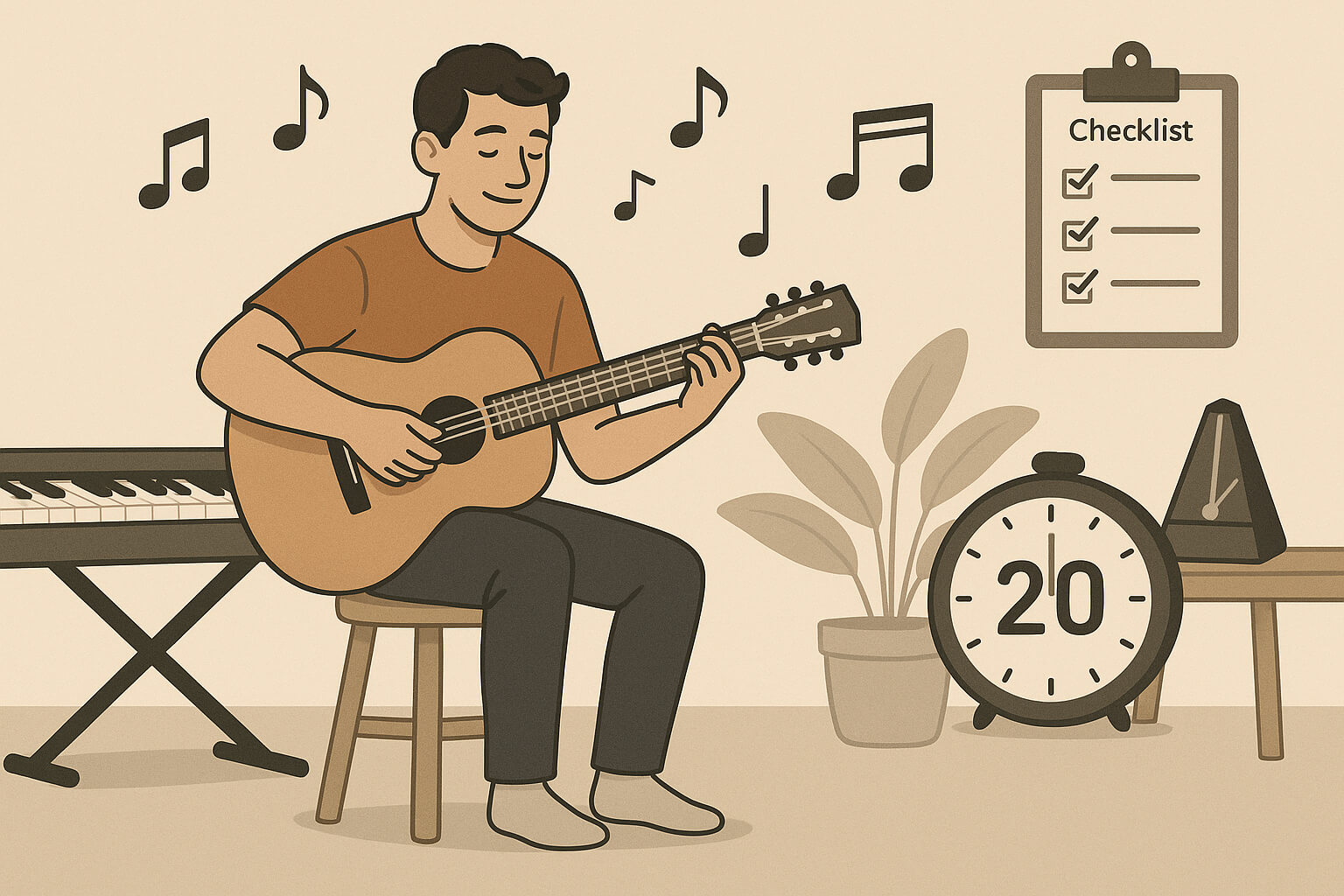Whether you're a beginner picking up your first instrument or a seasoned musician juggling work and life, finding time to practice can feel impossible. But here’s the truth: you don’t need hours each day to get better.
With the right structure and intention, even 20 minutes a day can lead to noticeable, consistent progress. The secret? Practicing smarter—not longer.
In this guide, you'll learn how to maximize a short practice session to improve technique, theory, creativity, and musical confidence—without burning out.
Why 20 Minutes a Day Can Make a Big Difference
Short, focused sessions are more sustainable and often more effective than sporadic long ones. Here’s why:
- They build muscle memory through daily repetition.
- They make practice a daily habit, not a chore.
- They keep your mind sharp without overwhelming it.
- They fit easily into busy schedules, which reduces procrastination.
Think of it like compound interest—small investments every day lead to big growth over time.
The 20-Minute Power Practice Routine
Here’s how to structure your time for maximum impact:
1. Warm-Up (3 Minutes)
Get your hands, fingers, and mind moving.
Try:
- Simple major/minor scales
- Finger dexterity exercises
- Clapping/tapping rhythm drills
- Breathing and posture checks (for singers/wind instruments)
This primes your coordination and shifts your brain into “practice mode.”
2. Technique Drills (5 Minutes)
Focus on one specific skill you want to master.
For example:
- Guitar: Chord transitions, hammer-ons, bar chords
- Piano: Arpeggios, scale patterns, left/right hand sync
- Violin: Bowing control, string crossings
- Voice: Vocal runs, intonation drills
Use a metronome and aim for slow, clean, and accurate before speed.
3. Song Practice (7 Minutes)
Work on a small section of a piece, not the whole song.
Focus on:
- Difficult passages
- Rhythm changes
- Transitions between sections
Use techniques like looping and slow practice to deeply learn sections before moving on.
4. Ear Training or Music Theory (3 Minutes)
Just a few minutes of brain work goes a long way.
Ideas:
- Identify intervals by ear
- Sing scales or melodies
- Practice naming chords
- Analyze the key and structure of a song you’re learning
Try: Ear Training Exercises: How to Hear Chords and Melodies
5. Creative Play (2 Minutes)
End on a high note with fun, free expression.
Try:
- Improvise over a chord progression
- Jam along with a backing track
- Make up a short melody or riff
Explore: Free AI Music Generator — Create Custom Backing Tracks
Practice Smarter, Not Harder: 5 Game-Changing Tips
- Set a micro-goal before each session
- Example: “I’ll play this four-bar phrase cleanly at 80 BPM.”
- ⏳ Use a timer
- Stay on track. Don’t let song practice swallow the whole 20 minutes.
- 🎙️ Record yourself occasionally
- Listening back reveals flaws you miss while playing.
- 📵 Remove distractions
- A 20-minute focused practice > 60-minute distracted one.
- 🔁 Revisit difficult sections regularly
- Mastery comes from repetition—don’t avoid the hard stuff.
Dive deeper: Practice Makes Perfect — Effective Strategies for Improving Musical Skills
Why Short Practice Works (and Often Works Better)
- ✔️ Promotes focused, intentional learning
- ✔️ Avoids mental fatigue and overplaying
- ✔️ Easier to commit to—no excuses
- ✔️ Keeps you engaged without pressure
- ✔️ Leaves room for creative exploration
And if you ever find more time? You can stack multiple 20-minute sessions throughout the day—like mental “reps.”
Free Resources to Supercharge Your Practice Routine
Final Thoughts: Progress is in the Process
- Practicing music doesn’t have to be long, stressful, or rigid. In just 20 minutes a day, you can build solid technique, expand your musical understanding, and reignite your creativity—as long as you stay consistent and intentional.
- Show up daily. Focus on one thing at a time. Celebrate small wins.
- Most importantly, make it enjoyable—because progress sticks when the process is fun.
